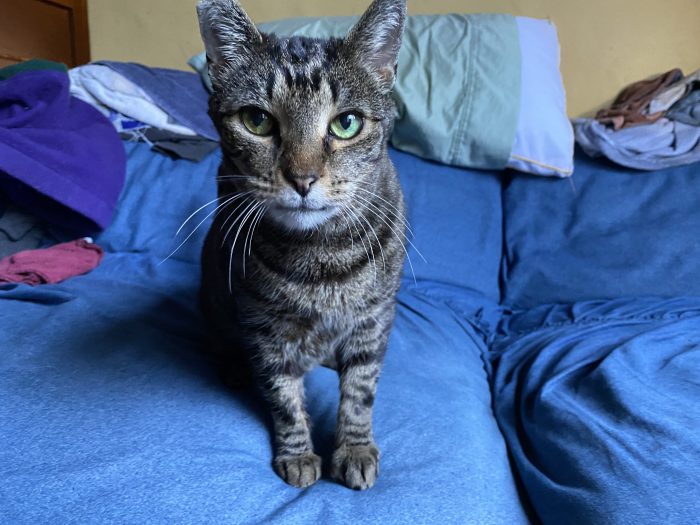My dear tabby cat Picasso is almost 14 years old. He is healthy, though most of his teeth were not and had to be removed.
So now he has this crooked smile.
Picasso is a leader and a friend to most—animals and people. He leads with his heart.
He was not always that way. As he aged, he grew into this. I call him my “right-hand cat.”
He came from a cat colony, and people were trapping/neutering/and returning the cats there. When they do that, they mark the cats who they have trapped and neutered by clipping a small part of their ear. Well, someone went overboard and butchered his right ear.
That divot in his ear seems more pronounced as he ages. He’s definitely an older cat. A “senior cat,” as a veterinarian would label him.
In American culture, we don’t seem to have the highest opinion of our older people. The culture at large often ignores them. But do we do the same with our animals?
I think so. Perhaps even more so.
As much as we love them, we can easily get lost in the weeds of the infirmities that they develop as they age. So once the physical issues show up, whatever they may be—anything from losing their hearing to cancer or some other debilitating illness—we see them more as these pitiful, breaking down bodies, and kind of forget who they really are.
Not were. Are.
My first-ever cat was a black cat named Bandit, who I adopted in my 20s. He passed in 2011. Oh, the things that I learned from him. The hard way—from making lots of mistakes.
Bandit was another charismatic cat who led with his heart. Picasso and Bandit would have liked each other. (Just would not have liked to live with each other. Two leader-type animals who are deeply attached to their people can have problems getting along.)
In addition to being a leader, Bandit was proud, opinionated, fiercely loyal, and loving to his best cat friend Hooper, and determined to be my right-hand cat. Just like Picasso would be, later on. He also hated the band AC/DC and would meow-shriek at me to turn it off at the first thundering chords of whatever song I started playing.
I stopped listening to AC/DC.
Later in life, Bandit was stricken with inflammatory bowel disease. There were a lot of ups and downs in Bandit’s final couple of years. For a couple of weeks, I had to feed him through a feeding tube. Every 15 minutes, I had to syringe in a tiny amount of mushy food, so this meant round-the-clock care. I had to take a leave of absence from my then corporate job.
He went through a grueling surgery and suffered the indignity of what I call the “clown cone” around his head. He would clunk around and bump into doorways, and give me his cat grimace that said, “Is this really necessary?”
He had to be on the same bland diet every day—and this is definitely something I regret. Food was so important to him, and the IBD formulas recommended by vets, on the whole, were not good quality food. Did it really help him?
He often strained to go to the bathroom, and because it was so bothersome and painful to go, sometimes he pooped outside of the litter box.
Through all these undignified problems, the one thing I got right with him, all-the-way right, was that I never forgot who he was. I suppose he made it easy for me to remember. He seemed to handle everything with dignity, even when he was bumping into walls.
He was still the charismatic leader. He remained boss of the house (my cats Butch and Sundance, who were young then, can attest to this) and the closest companion to me.
I was able to hold space for the frustration, the powerlessness, the grief, of witnessing my beloved friend’s body break down, while realizing that his spirit was still the proud, loving, passionate, demanding, beautiful black cat that he always was.
And is—since I am an animal communicator now, and can communicate with him even though he is not in his physical body.
Bandit passed in 2011 at age 17. To the day he died, he was the same vibrant, special soul to me that he had been as a kitten. I didn’t look away from his infirmities, but I knew that they didn’t define him.
I don’t know how much longer I have with Picasso. And thankfully, he’s not at a stage where we’re dealing with a lot of infirmities—partially because I learned from my mistakes with Bandit about how to take care of an animal. But I have come to appreciate Picasso as an older being—more so than even Bandit.
“Appreciating aging” is not something you hear every day.
I had a worker in our house recently, and Picasso, as he does with everyone, strutted right up to him to check him out. The guy saw Picasso’s crooked grin, his hole-punched ear, and blurted out, “How old is that cat?” In the tone and subtext of, “My god, how old is that wretched-looking cat?!”
I don’t see what this man saw.
I think that Picasso is more beautiful now then when I first adopted him as a kitten. It’s not just the physical features—it’s the energy he carries. The grand soul that he is and that he will always be.
It’s all there for us to notice in our animals. Especially in their older years, and especially especially when they’re sick or infirm.
As with our fellow aging humans, they’re still who they are. We just have to remember to see them.
~
Please consider Boosting our authors’ articles in their first week to help them win Elephant’s Ecosystem so they can get paid and write more.












Read 4 comments and reply